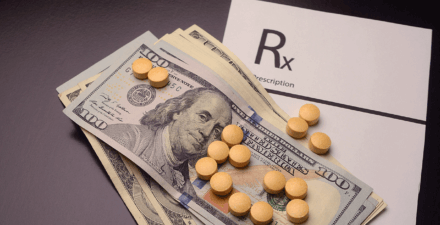Prescription drug pricing reforms in Congress are one step closer

The U.S. Senate is moving the country one step closer to helping rein in rising prescription drug prices by restoring market competition—in a rare example of bipartisanship on Capitol Hill. Building on progress in the House of Representatives, two Senate committees late last month passed legislation that the Washington Center for Equitable Growth advised the U.S. Congress would help achieve this goal.
On June 26, the Senate Committee on Health, Education, Labor, and Pensions passed S. 1826, a package of measures focused largely on healthcare costs. Included in the bill is the Creating and Restoring Equal Access to Equivalent Samples, or CREATES, Act of 2019, which would deter pharmaceutical companies from employing certain tactics to prevent manufacturers of generic versions of their drugs from bringing their products to market. The measure was introduced originally by Sens. Patrick Leahy (D-VT), Chuck Grassley (R-IA), Amy Klobuchar (D-MN), and Mike Lee (R-UT). The House of Representatives has already approved the CREATES Act.
Separately, the Senate Judiciary Committee, on June 27, approved S. 1224, a bill introduced by Sens. Klobuchar and Grassley aimed at preventing abuses of the Food and Drug Administration’s petition process that slow down regulatory approval of generics and biosimilars. The Stop Significant and Time-wasting Abuse Limiting Legitimate Innovation of New Generics, or Stop STALLING, Act would make it easier for the Federal Trade Commission to sanction pharmaceutical companies that file citizen petitions with the Food and Drug Administration without real cause other than a desire to slow the approval process.
Soaring U.S. pharmaceutical drug prices infuriate consumers, distort the healthcare system, provide sometimes unconscionable profits to drug companies, and, in too many cases, endanger lives. While the problem is complex, there is no doubt that efforts to stifle competition are an important factor. Low-cost alternatives such as generic drugs have had a significant impact on drug prices generally, and hopefully biosimilars will have a similar effect. But many companies, especially those that manufacture name-brand pharmaceuticals, have developed tricks to thwart the legal and regulatory framework that policymakers have built to make it possible for these drugs to enter the marketplace.
The CREATES Act addresses two specific drug company tactics. The first is what’s known in the industry as a sample blockade. Before the FDA okays the sale of a generic drug, its manufacturer must prove that it is the same as the branded medication. To gain this certification, the generic drugmaker needs samples of the branded version. Sometimes branded companies will make it difficult or impossible to obtain those samples, thus delaying or even preventing FDA approval of the generic. The CREATES Act establishes a process for ensuring that those samples are available to generic manufacturers.
The second tactic addressed by the CREATES Act that is used by drug companies to block generic competition is a so-called safety protocol filibuster. The law currently requires that generic manufacturers negotiate with the branded drugmaker to develop a single safety protocol. Branded manufacturers sometimes filibuster these negotiations. Without an agreement on protocols, the generic company cannot receive approval, unless it obtains an exception from the FDA to develop a different but equally safe system. Because the manufacturer already has approved protocols for its drug (known as Risk Evaluation and Mitigation Strategies, or REMS), the branded company can continue to sell its product while filibustering negotiations over a shared system with the generic. The CREATES Act responds to the exploitation by branded drug companies of current law by ending the assumption that a generic company and a branded company must agree to use the same safety protocols, thus eliminating the branded company’s ability to delay FDA approval by stalling over such negotiations.
Part of the approval process for new drugs, including generics, is the citizen petition, which individuals or organizations may file to express their concerns about a drug going through the approval process. Current law does not allow the Federal Trade Commission to impose sufficient sanctions to deter drug companies from filing endless petitions against generic manufacturers to slow down or block the approval of competing generics. And there are plenty of cases in which drug companies have done just that. The Stop STALLING Act would allow the FTC to toughen enforcement against drug companies abusing the process in this manner.
It would be premature to assume that these reforms and others are a foregone conclusion, as obstacles still exist, including lobbying by the pharmaceutical industry. Neither Senate committee, for example, included legislation that would prevent anticompetitive patent settlements in which the branded firm pays its generic competitor not to sell its product. This is an important element of the legislation already approved by the House. Yet the trajectory of the legislation is very promising, and the White House has expressed general support for elements of the House-passed legislation.
As I have written before, legislation to curb rising drug prices by allowing greater competition in the marketplace continues to defy the partisanship and legislative inertia that characterize the U.S. Capitol right now. Bipartisan House passage of the CREATES Act and other related bills, and now these bipartisan actions in the Senate, have given this issue considerable momentum. But industry efforts will continue to pose challenges to these needed reforms.





